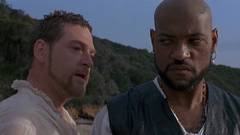CNN is reporting that Shakespeare has become the star of Muslim Awareness Week in England:
No matter that the bard was white, Christian and has been dead for nearly 400 years -- this week he is at the center of Muslim Awareness Week, a bid to highlight the contribution Britain's 1.8 million Muslims have made to society.
Ooohhh . . . kay . . .
"Shakespeare's plays are not about good versus evil, not about a world in which you are either 'with us or against us,"' said Shaykh Hamza Yusuf, a Muslim scholar who is lecturing on Shakespeare and Islam at The Globe this week.
"Shakespeare refuses to indulge in those cartoon caricatures of right and wrong. His plays are too complex for that."
Er . . . we are talking about Shakespeare, right? William Shakespeare? In Shakespeare, villains are evil because they are bastards (like Don John in Much Ado About Nothing or Edmund in King Lear) or black (like Aaron in Titus Andronicus) or Jewish (like the infamous Shylock in The Merchant of Venice) or born under the wrong star (like Regan and Goneril, again in Lear). Shakespeare never met a stereotype - a "cartoon caricature" - he didn't like.
 And Iago, the villain in Othello - of which Yusuf will have more to say shortly - has no convincing motivation for his villainy. Apart from hating Othello after being passed up for promotion, he is malevolent simply because he is Iago.
And Iago, the villain in Othello - of which Yusuf will have more to say shortly - has no convincing motivation for his villainy. Apart from hating Othello after being passed up for promotion, he is malevolent simply because he is Iago.
His voracious money-lender Shylock in "The Merchant of Venice," for example, is often blamed for reinforcing stereotypes of Jews and fueling anti-semitism.
Perfectly understandable, as Shakespeare himself probably never met a real Jew. They had been expelled from England three hundred years before his time. Whatever Shakespeare knew of Jews, he probably got it from other literature that reflected the same stereotypes.
But Yusuf, an American convert to Islam who heads an Islamic foundation in California, says Shakespeare's depiction of Muslims is not altogether hostile.
Othello is a noble, righteous soldier who leads the Venetian fight against the Muslim Turks before being fatally deceived by the nominally Christian villain Iago.
However, Othello is not a Muslim, but a Christian. In Act II, Scene 3, Othello breaks up a fight between Cassio, Roderigo, and Montano, demanding, "Are we turn'd Turks, and to ourselves do that / Which heaven hath forbid the Ottomites? / For Christian shame, put by this barbarous brawl" (II.3.170-72). Later in the scene, Iago in his soliloquy speaks offhandedly of Othello's baptism (II.3.343). For Shakespeare, a Renaissance Anglican, "baptized" and "Christian" would have been practically synonymous. Finally, in his death speech, Othello relates a story wherein he defended a Venetian by grabbing a "turban'd Turk" by the throat and then stabbing "the circumcised dog" to death (V.2.355). Is this how one Muslim speaks of another?
"Shakespeare is part of our heritage," said Shafeeq Sadiq, national coordinator of Islamic Awareness Week.
Yeah, you have not experienced Shakespeare until you have read him in the original Kling- I mean, Arabic.
Ain't multiculturalism and revisionist history fun? The problem with Shakespeare is, he's often too revered for his own good. Great as he was, he was poorly educated, in a disreputable profession (for the day), and cribbed most of his ideas from other plays. He was a man of his time and subscribed to many of the prejudices of his day. It's just silly for Muslims to attempt to claim him for themselves.



No comments:
Post a Comment